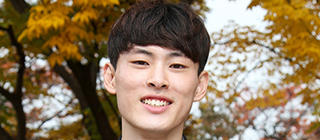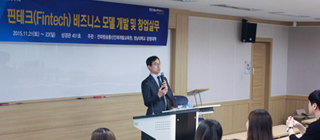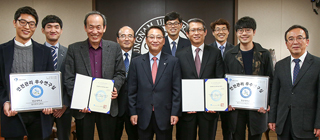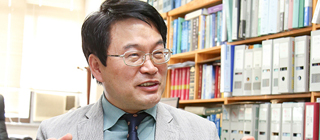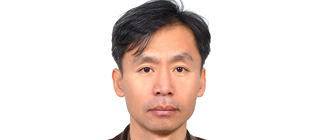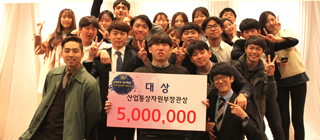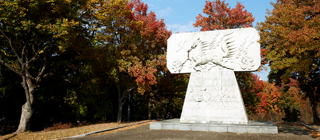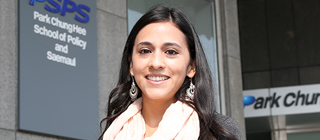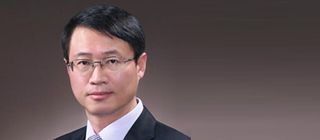-
Produced over 100 videos, total views over 6.5 million, comments from over 40 countries Pharmacist from the YU School of Pharmacology, currently working on master’s degree at graduate school Produced videos while preparing for state examination for pharmacist, worldwide issue [November 17, 2015] “I just made the videos for the fun of others and myself. I did not know it would make such an issue!” Koh Toe-gyeong (25) is a ‘Facebook Star’ with 350,000 followers. Koh’s videos on his Facebook account recently reached 1.6 million views and is enjoying celebrity-status popularity. He is receiving a great deal of interest not only in Korea, but also in the US, France, Japan and China. The video that received so much attention is a four minute video that Koh edited from the comic videos that he had been producing in the past. His videos received so much attention that he is even called the ‘Second Psy’ on SNS. What is more amazing is that he is a pharmacist in his 20s who passed his state examination for pharmacists earlier this year. Mr. Koh graduated from the YU School of Pharmacology in February of this year and is currently working on his master’s degree majoring in pharmacology. The official name of the channel that Mr. Koh runs on Facebook and YouTube is ‘Toe-gyeong, Time for Medicine’. Mr. Koh said, “My friend made up the name because I am a pharmacist and my behavior in the videos are pretty crazy. I really like the name.” Mr. Koh began to produce the videos and upload them on Facebook from last year while he was busily preparing for the state examination for pharmacists. He said, “I took breaks from studying for my state examination and produced the video. I worked hard on both the videos and my studies.” He also added, “I really enjoyed producing the videos so I was actually able to relieve some stress while preparing for the examination.” Mr. Koh comes up with dances, behavior and outfits together with songs and films them with various facial expressions and then edits them according to his desired concept to make the videos. The videos Koh produced until now number over 100. On average he produced one video every three days and uploaded them to Facebook and YouTube. The total number of views of his videos surpassed 6.5 million and there were over 40 countries from which people left comments after watching his videos. Koh said, “I think many foreigners enjoy it because of the music and the power of SNS', while adding, ”The reason for producing the videos was simple. I just wanted to make people laugh. It is very rewarding to see even foreigners saying that they felt better after watching my videos.“ Koh said that unlike the comic and off-the-wall image in the video, he is actually quiet and shy. He stated, “My parents did not know about this at all, but one day, a fan of mine noticed me on the street while I was walking with my mother in downtown Ulsan, and so she found out about the videos I made,” and added, “Perhaps it’s because of my personality, but my parents were very approving that I was living okay alone.” This young pharmacist says that he still wants to study hard while making these videos. He stated, “When I was young I wanted to work with television. Just as there are many chefs appearing on various shows now, the diversity of SNS and media is making it possible for the general public to become stars.” He added, “I would also like to pursue my professional career as a pharmacist and also work with other media to entertain people.”
-
Two-day education on ‘Fintech business model development and startup’ Goal to foster experts for the fintech industry [November 25, 2015] YU (President Noh Seok-kyun) is speeding up its efforts to foster professional manpower that will lead the domestic and international fintech market. The YU School of Business held a fintech startup human resource fostering education program under the theme ‘Fintech Business Model Development and Startups’ at the Business and Economics Hall Room 451 for two days on the 21st and 22nd. This education program that was sponsored by the Ministry of Science, ICT and Future Planning and co-hosted by the YU School of Business and the Broadcasting and Communication Human Resources Development Education Center, was offered so that students can train their capacities to develop innovative business models in the fintech market that has recently been on a rapid rise, as well as to start-up their own companies related to fintech. A total of 45 people participated in this education session that included not only YU students, but the general public interested in startups related to fintech. Education on the concept of fintech, the domestic and international fintech market status, and business models of financial industries was provided on the 21st. On the 22nd, practical education such as on the electronic finance industry act of Korea, regulations and development programs for fintech in advanced countries in the financial industry such as the US and England, as well as eduction on starting up fintech companies were provided. Byeon Won-seok (23), a junior at the YU School of Business who attended the session, said, “My goal is to land a job in the financial sector so I have been interested in internet-exclusive banks and fintech education so I attended this education program. Though it was short, it was possible to clearly check the fintech market status and business models.” He added, “Though there is a high level of interest in fintech as a future financial industry, it is not easy to receive actual education or find information. It would be nice if more of such extracurricular courses are offered to help strengthen the capacities of students for employment or to start up their own businesses,” YU School of Business Professor Kim Jeong-gun who prepared for this education program said, “At this point of time where fintech industries such as Samsung Pay and SSG Pay are receiving attention, ours was the first education session on fintech startups for the Daegu and Gyeongbuk regions.” He also added, “YU will proactively foster experts in the fintech industry, which is receiving attention as a major industry for the ICT convergence era.”
-
Energy and Materials Engineering Lab (Professor Ryu Shi-ok) and Physics and Chemistry Lab (Professor Kim Seok-kyu) Plaque bestowed by the Minister of Science, ICT and Future Planning Kim Young-soo of the Environment Facility Team receives medal for ‘Outstanding Manager for Safe Lab Environment’ [November 11, 2015] Two labs at YU (President Noh Seok-kyun) were selected as the Ministry of Science, ICT and Future Planning’s (Minister Choi Yang-hee, hereinafter ‘MSIP’) ‘Excellent Safety Management Lab’. At the ‘9th Lab Safety Day’ held on the first floor of the GS Tower at Yeoksam, Seoul held on the 9th, the YU Energy and Materials Engineering Lab (School of Chemical Engineering Professor Ryu Shi-ok) and the Physics and Chemistry Lab (Department of Environmental Engineering Professor Kim Seok-kyu) received a certification and plaque for being selected as ‘Excellent Safety Management Labs’ by the MISP. After the Water Treatment Lab (Department of Environmental Engineering Jung Jin-young) was selected last year, YU labs were recognized as labs with outstanding safety management from the government for two consecutive years. The ‘Excellent Safety Management Lab Certification Program’ is a government program that gives certifications for labs with excellent safety management levels and activities through reviews by experts in order to strengthen the self-safety management capacities of research labs in the science technology sector installed in universities and research institutes, while also finding and spreading standard safety management models. Prior to the full-fledged implementation of this program, the MISP pursued the ‘Excellent Safety Management Certification Program’ since July 2013. After a three year pilot program, it will use its experience to operate the program in full starting from 2016. The certification evaluation will undergo document review and field review in a total of 29 items in three fields such as the ▲Lab safety environment system (12 items) ▲Lab safety environment activity level (13 items) ▲Lab safety management personnel’s safety awareness (4 items). In the third-year of the program this year, two labs from YU were included in the 37 total labs under research institutes, corporate attached research centers, and universities. The two labs selected received high scores in the research safety activity sector such as for hazardous material risk analysis in experimentation procedures and accident response training, as well as in the safety awareness of lab personnel. In particular, activities to improve environmental safety through mentoring together with other outstanding labs were said to be consistent with the purpose of the excellent lab certification program. YU President Noh Seok-kyun said, “Taking care of the lab’s safety environment is the most important factor to gain excellent research achievements,” and added, “I hope that with this certification, all of the labs at our school will establish pleasant research environments, while spreading a culture of safety awareness.” Meanwhile, Kim Young-soo (45) of the Environmental Facility Team was selected as an outstanding manager for lab safety environment at this event and received a medal from the Minister of Science, ICT and Future Planning. Mr. Kim was recognized for his contributions in raising safety awareness of employees in research through the development of various educational programs such as faculty and foreign researcher safety education.
-
Published over 50 papers in past two years in prominent SCI journals such as <Green Chemistry> and <Chemical Science> [November 11, 2015] School of Chemical Engineering Professor Lee Yong-rok (56) was selected in the ‘Excellent Achievements in the 2014 Ministry of Education Academic Research Support Projects’ and received a medal from the Minister of Education on the 10th. Professor Lee Yong-rok carried out the ‘research on directly reacting cyclic ether, ether and alcohol under transition metal catalyst with phenol to generate carbon-carbon combination. The results of this study was recognized as groundbreaking synthesis technologies and was published in the 2014 14-15 issues of <Advanced Synthesis & Catalysis (Impact Factor-5.663)>, which is one of the world’s most authoritative academic journals in the applied chemistry sector, being in the top 1.4%. Professor Lee, who is an authoritative figure in the organic compound sector, became a professor at YU in September 1995 and has been active in research and published over 200 papers on organic compounds during his tenure. He recently published studies in <Organic Letters (IF-6.364)> published by the American Chemistry Association, which is the most prestigious academic journal in the organic chemistry field, and <Green Chemistry (IF-8.02)> published by the British Chemistry Association, among the 50 SCI studies including 13 papers with IF of over 5 in the past two years. In particular, three of the studies that he published this year were published as the poster papers of globally renowned academic journals and received the attention of academic circles. Professor Lee recently developed new organic synthesis methods with high potential to be used for the development of new pharmaceutical products, which was published <Chemical Science (IF=9.211)>, which is the world’s most prominent journal in the chemical sector published by the British Chemistry Association. The organic synthesis method developed by Professor Lee uses organic catalysts or bases that is easy to purchase for commercial use, rather than organic synthesis methods that use expensive metal catalysts, and it is both environment-friendly and economical. It is therefore expected to be used by many organic chemists and pharmacologists in the future. Professor Lee was also selected as the best reviewer for two consecutive years in 2013 and 2014 by Tetrahedron, an internationally acclaimed organic chemistry journal, and last year, he was selected as an outstanding evaluator for fundamental research projects by the National Research Foundation. He is also continuing his activities in academic circles such as acting as a member of the world college evaluation committee for QS, a British college ranking institute.
-
Published 27 SCI papers in past 3 years, 24 patents registered, technology transfer worth 200 million won Confirmed to be registered in the Marquis' <Who's Who in the World> 2016 issue [November 6, 2015] School of Chemical Engineering Professor Han Sung-soo (51) was awarded the ‘Meditex Award’ in the 2015 academic conference co-hosted by the Korean Fiber Society and the Korean Society of Dyers and Finishers held at BEXCO in Busan on the 5th. He was awarded for his excellent achievements in research and contributions to the development of the fiber industry. The ‘Meditex Award’ was created by the Korean Fiber Society (Chairman Jeon Han-yong) with funding by BSG (CEO Hong Hong-yoon), and it is in its fifth year this year. The award is given to members who made groundbreaking contributions to academic and technological development through creative R&D in medical applications and related textile engineering sectors. Professor Han’s main scope of research is in the polymer material application and he published 27 SCI papers (correspondence author) in the past three years and he has also registered 24 patents in related fields as well. Furthermore, he also made technological transfers worth a total of over 200 million won with bio gel applied products, high-absorption organic gel application products (spray-type mask pack development), and hydro gel film technologies, and has been highly active in research in the medical materials field. Professor Han earned his PhD at Seoul National University and began serving as a professor at the YU Department of Textil Engineering and Technology since 1995. In 2003, he worked as a visiting scholar at the North Carolina State University Department of Textiles in 2003 and at the Purdue University College of Pharmacy in 2010. Currently, he holds the post of director of the YU Organic Gel Cluster Project Team, director of the Textiles Fashion Materials Regional Cooperation Research Center, and vice-director of the IT/Energy/BT Industry Customized Creative Chemical Engineer Fostering team. Outside of the university, he is serving as the editing chairperson of the National Defense Technology Society, and is also working with the Korean Fiber Society, Polymer Society of Korea, and the Korean Society for Biomaterials. He will also be registered in the ‘2016 Marquis Who’s Who in the World’, which is one of the world’s three most authoritative biographical dictionaries.
-
Highlighted for legal analysis such as on customs laws and WTO anti-dumping agreements based on actual cases Grand prize in 2012 and 2014 as well ‘International Economic Research Association’ of the School of International Economics and Business Team proven to be cradle for fostering trade experts [November 1, 2015] <‘International Economic Research Association’ of the School of International Economics and Business that won the ‘grand prize’ at the 2015 Collegiate Trade Remedy Contest> Students of the ‘International Economic Research Association’ of the School of International Economics and Business received the honor of ‘grand prize’ at the ‘2015 Collegiate Trade Remedy Contest’. They took the ‘first place award’ in this contest in 2012 and 2014, and once again outranked the competitors this year proving that the YU School of International Economics and Business is the cradle for fostering trade experts armed with practical capabilities. The ‘College Trade Remedy Contest’ was first held in 2005 hosted by the Trade Committee (Chairman Hong Soon-jik) and sponsored by the Korean Federation of Small and Medium Businesses (Chairman Park Sung-taek) with the goal of enhancing interest in trade remedy programs among college students and to foster experts in trade remedy programs. This year marked its 11th year and a total of 218 people from 11 universities around the nation. After undergoing preliminary reviews in September, six final teams went to the main contest including YU. The main contest that was held at the SMBA DMC Tower DMC Hall in Seoul on October 29 was comprised of theater performances lasting for 40 minutes for each team. In result, the YU ‘International Economic Research Association’ took home the grand prize and won the Minister of Trade, Industry and Energy Award and a five million won cash prize. This year, a scenario was set with traditional trade remedy programs such as anti-dumping, compensation duties and safe-guard systems, as well as the unfair trading area such as infringement of intellectual property rights and violation of indicating places of origin that have been growing problems recently. The teams demonstrated the series of procedures from investigation of cases to trade remedy judgments in the form of a theatrical play. The theme presented by the International Economic Research Association was ‘Dumping of Chinese Plywood and Damages to the Domestic Industry’. They presented the course of resolving industrial damages of domestic plywood manufacturers due to dumping exports by Chinese companies through trade remedy programs of the Trade Committee. 22 students of the YU International Economic Research Association prepared for this for fourth months from the end of June, splitting the roles into the script team, props team, and acting team to make the scenario and play more realistic. They demonstrated the series of procedures starting from fact-finding processes on dumping for plywood exports of Chinese companies, and levying customs duties as investigation for trade remedies, and closed with judgments, receiving good reviews from judges and participants. Kim Hyun-shik (22), a senior in the School of International Economics and Business who participated as the team leader, said, “Instead of focusing too much on dramatic elements, we carefully drew up the scenario to demonstrate the actual roles of the Korean Federation of Small and Medium Businesses and Trade Committee,” while adding, “I think we received good scores by logically expressing the remedy procedures of domestic small and medium businesses by applying legal stipulations such as customs duties laws and the WTO anti-dumping agreement in actual industrial cases.” The YU School of International Economics and Business International Economic Research Association was founded in 1989. This is an undergraduate academic club for researching international economics and it currently has over 100 member students.
-
First place in overall ranking for regional private universities Education conditions, professor research, reputation, and overall ranking improved 4 to 15 places Start-up education 13th, community contribution 17th, employment hope 18th, etc [October 20, 2015] YU (President Noh Seok-kyun) took first place in overall rankings among regional private universities in the ‘2015 Joongang Ilbo College Evaluations’ by rising from as little as four to as much as fifteen ranks in all areas of evaluation. Joongang Ilbo announced the results of its college evaluations for this year on its newspaper on the 20th. According to this, YU rose in ranks in all areas of evaluation by ranking 25th in overall ranking, 26th in education conditions, 18th in professor research, and 25th in reputation. Index Category Detailed Index Score Detailed Index (Points) Detailed Index Rank Professor Research 18th 1.Research funding per professor on average in track 6 1.317 15 2.International academic journal thesis per professor on average in track 62 1.146 13 3.Citations per international academic journal thesis per track 21.9 1.091 9 4.Citations of humanities and sociology translations 2.7 0.987 17 5.Publications in domestic humanities and sociology theses 3.6 1.188 volumes 11 In particular, it ranked 18th in the nation for the professor research sector. This was ranked seven places higher than the previous year. In the detailed index that assesses research capacities, it placed 9th for the number of citations in international theses showing that it had especially high levels of quality for the theses. This is the result of the university-wide effort to improve the research level. As part of this, in 2013, YU became the only university in Korea to introduce the ‘Research Materials Support Project’ that funds a total of four billion won in four years by selecting 25 professors in the top 30% for research capacities. In order to improve the quality of research, it has been implementing an innovative research support program that assesses professor achievements using qualitative indices such as number of citations of theses and technological fee income rather than the quantitative index of the number of theses and number of patents. On this, the Industry-Academic Research Office Director Park Jin-ho said, “We believe that there must be active research for development of education and industry-academic cooperation, so we are preemptively reacting to environmental changes and providing full support.” Top 20 Universities by Track Humanities Track Sociology Track Rank University Rank University 1 Seoul National University 1 Seoul National University 2 Korea University 2 Hanyang University (ERICA) 3 Sungkyunkwan University 3 Sungkyunkwan University 4 Sogang University 4 Korea University 5 Ewha Womans University 5 Ewha Womans University 6 Chung-ang University 6 Kyung Hee University 7 Yonsei University 7 Yonsei University 8 Konkuk University 8 Chung-ang University 9 Hanyang University (ERICA) 9 Chonbuk National University 10 Kyung Hee University 10 Dongguk University 11 Dongguk University 11 Jeju National University 12 Hankuk University of Foreign Studies 12 Hankuk University of Foreign Studies 13 Hallym University 13 Sogang University 14 Sookmyung Women's University 14 Kyungpook National University 15 Inha University 15 Hongik University 16 Chonbuk National University 16 Sunmoon University 17 Pusan National University 17 Konkuk University 18 Sunmoon University 18 Pusan National University 19 Chungnam National University 19 University of Seoul 20 Chonnam National University 20 Yeungnam University 21 Yeungnam University Natural Science Track Engineering Track Rank University Rank University 1 POSTECH 1 POSTECH 2 KAIST 2 KAIST 3 Seoul National University 3 Hanyang University (ERICA) 4 Yonsei University 4 Sungkyunkwan University 5 Korea University 5 Seoul National University 6 Sogang University 6 Korea University 7 Ewha Womans University 7 Yonsei University 8 Ajou University 8 Hanyang University (ERICA) 9 Kyung Hee University 9 Sogang University 10 Chung-ang University 10 Korea University of Technology and Education 11 Hanyang University (ERICA) 11 Dongguk University 12 Inha University 12 Inha University 13 Dongguk University 13 Pusan National University 14 Korea University 14 Yeungnam University 15 Konkuk University 15 Konkuk University 16 Yeungnam University 16 Kyungpook National University 17 University of Ulsan 17 University of Seoul 18 Chonbuk National University 18 Kookmin University 19 Pusan National University 19 Chonbuk National University 20 Kyungpook National University 20 Ajou University In the evaluation by track, which was conducted for the first time this year, all tracks were in the top 30. In particular, the engineering track placed 14th and the natural science track was ranked 16th in the nation. YU was the only regional private university to be ranked in the top 20. It also ranked 20th in the sociology track and 26th in the humanities track. In addition, YU took 18th place for universities from which hiring is desired, 17th in university with highest contribution to the community, 13th in start-up education, and 10th place in foreign professor percentage, and was thus once again recognized for reputation, student education efforts and performance, and excellence of education conditions. On the 16th of this month, YU was also selected for the top university in employment support and student capacity development programs, thus receiving the Minister of Employment and Labor Award. Index Category Detailed Index Score Detailed Index (Points) Detailed Index Rank Reputation 25th 1.University from which hiring is desired 6.2 2.870 18 2.University with proper education in major or general education needed for work 2.8 2.220 24 3.University with excellent student education 2.6 1.850 23 4.University with high contribution to the community 2.9 6.280 17 Index Category Detailed Index Score Detailed Index (%) Detailed Index Student Education Efforts and Performance 26th 1.Graduate start-up activities 3 0.079 9 2.Start-up education ratio 5.8 16.438 13 3.Online lecture disclosure 10 0.414 1 Index Category Detailed Index Score Detailed Index Detailed Index Education Conditions 1.Donations from tax revenue 2.7 3.111% 15 2.Ratio of foreign professors 6.9 17.527% 10 3.Diversity of foreign students 4.8 2.166 points 13 4.Scholarships compared to tuition 11.2 21.255% 22 Universities of Venture Start-ups Rank University No. of Venture Founders 1 Hanyang University (Seoul) 534 2 Seoul National University 449 3 Inha University 387 4 Yeungnam University 379 5 Dong-A University 317 6 Pusan National University 314 7 Korea University (Anam) 308 8 Yonsei University (Seoul) 292 9 Sungkyunkwan University 290 10 Kyung Hee University 262 *Tallied from over 10,000 presidents of venture-certified companies by the Korea Technology Finance Corporation
-
Only private university outside of Seoul area to rank in top 10 Total 8 graduates such as CJ Vice-chairman Lee Chae-wook (Law 64), LG Electronics President Kim Jong-shik (Electronic Engineering 72) Alma Maters of CEOs of Top 30 Companies Rank University 2015.2Q 2014.2Q Fluctuation No. of CEOs Percentage (%) No. of CEOs Percentage (%) No. of CEOs Percentage (%P) 1 Seoul National University 111 31.50 125 34.20 -14 -2.7 2 Yonsei University 47 13.40 41 11.20 6 2.1 3 Korea University 45 12.80 49 13.40 -4 -0.6 4 Hanyang University (ERICA) 16 4.50 18 4.90 -2 -0.4 5 Hankuk University of Foreign Studies 14 4.00 15 4.10 -1 -0.1 6 Sungkyunkwan University 13 3.70 14 3.80 -1 -0.1 7 Sogang University 9 2.60 10 2.70 -1 -0.2 8 Pusan National University 9 2.60 8 2.20 1 0.4 9 Yeungnam University 8 2.30 6 1.60 2 0.6 10 Kyungpook National University 8 2.30 5 1.40 3 0.9 11 Soongsil University 4 1.10 2 0.50 2 0.6 12 Dongguk University 3 0.90 3 0.80 - 0.0 12 Myongji University 3 0.90 3 0.80 - 0.0 12 Ewha Womans University 3 0.90 3 0.80 - 0.0 12 Chung-ang University 3 0.90 3 0.80 - 0.0 16 Waseda University 3 0.90 3 0.80 - 0.0 17 Kyung Hee University 2 0.60 1 0.30 1 0.3 17 Konkuk University 2 0.60 2 0.50 - 0.0 17 Chonnam National University 2 0.60 2 0.50 - 0.0 17 Korea Aerospace University 2 0.60 2 0.50 - 0.0 17 Cheongju University 2 0.60 4 1.10 -2 -0.5 17 Aoyama Gakuin University 2 0.60 2 0.50 - 0.0 17 Ohio University 2 0.60 2 0.50 - 0.0 24 Kyonggi University 1 0.30 - 0.00 1 0.3 24 Dankook University 1 0.30 - 0.00 1 0.3 24 Jeonju University 1 0.30 - 0.00 1 0.3 24 Jeju National University 1 0.30 - 0.00 1 0.3 24 Chungnam National University 1 0.30 - 0.00 1 0.3 24 Carnegie Mellon University (CMU) 1 0.30 - 0.00 1 0.3 24 Harvard University 1 0.30 - 0.00 1 0.3 SKY Subtotal 203 57.70 215 58.90 -12 -1.2 Seoul Subtotal 277 78.7 294 80.5 -17 -1.9 Other Province Subtotal 43 12.2 38 10.4 5 1.8 All CEOs 352 365 -13 [October 27, 2015] Source: CEO Score YU (President Noh Seok-kyun) was ranked ninth in the nation for the ranking of universities that graduated CEOs of the top 30 company groups that lead the domestic financial circles. According to an analysis by ‘CEO Score’ (CEO Park Joo-geun), a corporate management performance evaluation firm, there are a total of 352 CEOs (including chairmen, vice chairmen and presidents) in the top 30 companies. There were a total of eight who graduated from YU, thus ranking ninth in the nation and first in private universities outside of Seoul. It was the only private university outside of Seoul to be ranked in the top 10. The top 10 were made up of SNU with 111, Yonsei University with 47, Korea University with 45, Hanyang University with 16, Hankuk University of Foreign Studies with 14, Sungkyunkwan University with 13, Sogang University and Pusan National University with 9 each, and Kyungpook National University with 8. CEOs from YU are CJ Vice-Chairman Lee Chae-wook (69, Law ‘64), Dongbu Consulting CEO Baek Suk-gi (64, Economics ’72), LG Electronics CEO Kim Jong-shik (62, Electronic Engineering ‘72), Doosan Construction CEO Lee Byeong-hwa (61, Architecture ’74), Hyundai Steel CEO Kang Hak-seo (60, Business Administration ‘79), Lotte Construction CEO Kim Chi-hyeon (60, Trade ’74), Shinsegae Construction CEO Park Geon-hyeon (59, Business Administration ‘75), and Hyundai Powertech CEO Jung Il-soo (57, Mechanical Engineering ’76). Meanwhile, in the Top 100 company CEO education analysis announced by the Monthly Modern Business, a business magazine, in April of this year, YU was ranked sixth nation-wide and first in universities outside of Seoul. YU was also ranked sixth in the nation and first outside of Seoul for two consecutive years in the KOSDAQ Association’s ‘CEOs of KOSDAQ Listed Companies’, displaying the power of alumni leading Korea’s financial world.
-
Former Assitant Secretary Bermeo, next-generation leader who took major roles as college professor and in the government in her 20s “I will think of a ‘Saemaul Undong’ project that can be applied to Ecuador” Park Chung Hee School of Policy and Saemaul, 83 people from 34 countries newly enrolled for second half of 2015 [October 26, 2015] “I am convinced that the Saemaul Undong and Saemaul spirit will help in the development of my home country, Ecuador.” Former Assistant Secretary of Ecuador Maria Bermeo (30, photo), who took her first class as a new student for the YU Park Chung Hee School of Policy and Saemaul master’s degree course, voiced her impression with an air of excitement. Despite being only 30 years old, she has served as a college professor as well as holding important government posts and is judged to be a key leader of the future in Ecuador. The reason why this lady with such a bright future selected YU was to learn the ‘Saemaul Science’. She said, “The purpose of my study here is to learn the systematic theories and practical policies of the Saemaul Undong, as well as the Saemaul spirit and look for ways to apply it to fit my country’s situation.” She already holds a master’s degree. After graduating from the Universidad del Azuay in Ecuador, she earned her master’s degree at the Monterrey Institute of Technology and Higher Education, Monterrey Campus in Mexico. From June 2010 to September 2012, she served as a professor at her alma mater, Universidad del Azuay, and then worked as the Assistant Secretary at the Education and Science Ministry from 2013 to February 2015. She said, “After joining the government and working on tasks related to higher education, science technology and innovation, I took the development of Korea as a role model in many instances. The Saemaul Undong and Saemaul spirit was always a keyword in this.” She added, “At the Park Chung Hee School of Policy and Saemaul, I not only have the opportunity to share knowledge with professors and experts having various academic backgrounds, rather than leaning to any one specific field, and I can also study with public officials and policy legislators and workers from various countries to share the success cases and experiences of different countries, while creating a global network” as she once again explained the reason why she chose YU. She said that when she first visited Korea to attend a seminar on public policy two years ago, she was very impressed with the development of Korea starting at Incheon Airport. She said, “In addition to the Korean culture and the hospitality of Koreans, I loved everything about Korea from the educational environment of universities to its teaching methods,” and added, “During my studies here, I am planning to study the Korean language so that I can go back to my home country after gaining not only academic knowledge, but also a deeper understanding of Korea.” On the other hand, on October 19, the YU Park Chung Hee School of Policy and Saemaul greeted 83 students from 34 countries, including Former Assistant Secretary Bermeo and senior-ranking public officials and professionals of various countries as new students for the later term of 2015. These students who were admitted after a 8.9 to 1 competition rate will complete a one-year and six-months master’s degree program (lectures for 3 semesters, thesis class for 1 semester), and become masters of the Saemaul Science if there thesis passes. It is judged that the reason why important figures from around the world are gathering at YU is because of the influence of past graduates of the Park Chung Hee School. The 120 plus graduates of the Park Chung Hee School have taken important positions in their governments and society and are spreading the Saemaul Undong. Gasana Richard (40), who earned his master’s in public policy and leadership at the Park Chung Hee School in May 2014, was recently elected as mayor of Gatsibo in Rwanda, while Demeke Atlaw Melke (38) is currently the assistant-director of the agricultural bureau in Amhara, Ethiopia. <Orientation for 2015 Park Chung Hee School Newcomers> The Park Chung Hee School of Policy and Saemaul, which was established in November 2011 to share the Saemaul Undong and Korea’s development experience with public officials and employees of the public sector in emerging countries and to foster global Saemaul leaders, was selected in March 2014 for the KOICA ‘Community Development Leader Fostering Master’s Degree Program’ and in April 2015 for the KEITI’s ‘Emerging Country Public Official Master’s Degree Program’, and has constructed an unparalleled position as an institute for fostering experts in the Saemaul international development experts. A total of 342 international students from 57 countries have enrolled and 123 people from 37 countries received their master’s degree as of October 2015.
-
Excellent research achievements and contributions to development of the pharmaceutical industry Development of drug delivery system such as new improved drugs and research on new drug formulation [October 23, 2015] College of Pharmacy Professor Yong Cheol-soon (59) received the ‘Yoon Gwang-yeol Pharmacy Award’. At the 2015 Pharmaceutical Society of Korea Fall Academic Conference held at the Hotel Inter-Burgo EXCO in Daegu on the 22nd, Professor Yong Cheol-soon received the Yoon Gwang-yeol Pharmacy Award for his excellent research achievements and contributions to the development of the pharmaceutical industry. The ‘Yoon Gwang-yeol Pharmacy Award’ is an award co-sponsored with the Pharmaceutical Society of Korea with funding by the Buchaepyo Gasong Foundation (President Yoon Do-joon, Chairman of Dong Wha Pharm. Co.). It is the eighth year of this award that is granted to members who made great contributions to the development of the pharmaceutical industry and displayed excellent research achievements for at least ten years. Professor Yong developed various drug delivery systems including new improved drugs and researched new drug formulations. He is currently engaged in research for next-generation drug delivery substances such as research on advancing drug delivery nano-particles to reduce tolerance and side effects while maximizing effects of anti-cancer drugs. In the past ten years, he has been highly active in research and published 182 SCI theses, while registering and applying for 37 patents. Professor Yong earned his PhD at the University of South Carolina in the United States and was appointed as a professor of pharmacology at YU in 1991. He also served as the Dean of the YU College of Pharmacy, Dean of the Graduate School of Clinical Pharmacology, Chief of the Pharmaceutical Development Research Center, and Director of the BK21 Project Team. Outside of the university, he served as the chairperson of the Korean Society of Pharmaceutical Sciences and Technology, Vice Chairman and Yeongnam District Director of the Pharmaceutical Society of Korea, chairperson of the 2013 AFPS (Asian Federation for Pharmaceutical Sciences) organization committee and its senior vice-chairman. Furthermore, he was registered in the ‘Marquis Who’s Who in the World 2015’, which is one of the world’s top three biographical dictionaries, as well as the ‘IBC Top 100 Professionals’ of the Cambridge IBC (International Biographical Centre) of England. Professor Yong is currently active in various areas for the development of Korea’s pharmaceutical industry by serving as the APFS chairperson, chairperson of the Pharmaceutical Sciences and Technology Subcommittee, Vice-chairperson of the 2017 FIP (International Pharmaceutical Federation) Seoul General Assembly, Korean Association of Pharmacy Education Practice Committee chairperson, Health Insurance Review & Assessment Service Medicine Coverage Assessment committee member, Ministry of Food and Drug Safety advisor, National Health Personnel Licensing and Examination Board Pharmacy Foreign University Accreditation Review Committee member, Ministry of Health and Welfare independent review process reviewer, and vice-chairperson of the Korean Pharmaceutical Association International Committee.
